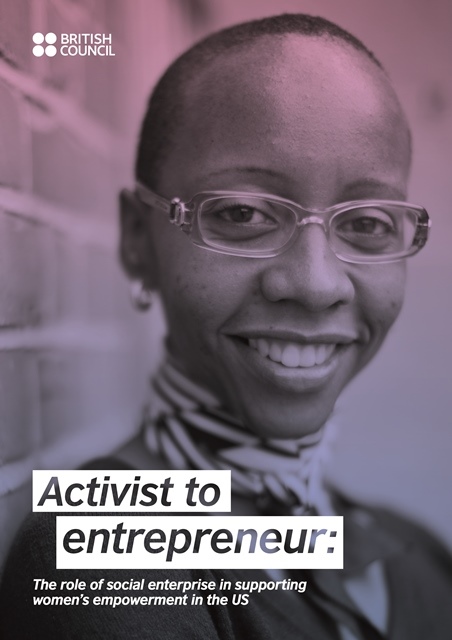How US women are empowered through social enterprise
The US likes to think of itself as the world’s greatest democracy, the land of the free, or, in former President Obama’s words, “the wealthiest, most powerful and most respected nation on Earth”.
The US is the place where you can achieve your dreams, regardless of your gender, race or roots. And, according to Forbes, more powerful women live and work in the US than any other country: there’s Hillary Clinton, Sheryl Sandberg and Beyonce; Oprah Winfrey, Jennifer Lopez and Arianna Huffington, to name just a few.
Yet even here – in this land of opportunity for all – most women have not reached equality with men. Only one in five members of Congress is a woman; women earn just 60 cents for every dollar earned by a man (and less if they are Latina); and only 4 per cent of Fortune 500 CEOs are women.
The issue is very much on the agenda in the US at the moment. In January 2017, the day after President Trump’s inauguration, half a million people took part in the Women’s March in Washington (pictured top), calling for better rights for women. And the movement continues with a Women’s Convention planned for the end of October in Detroit which, it is said, will mark “the beginning of a political groundswell”.
 Social enterprises form a small but growing part of the struggle for greater social justice in the US. Some specifically focus on helping the most excluded women take their first steps towards a better life; others, by acting as good and fair employers, help achieve a more balanced workplace. And it is in this context that the British Council has carried out research to discover how well social enterprise is addressing gender inequality and women’s empowerment in the US. The report, Activist to Entrepreneur: The role of social enterprise in supporting women’s empowerment in the US, is one of a series of five which examine the same theme in Brazil, India, Pakistan and the UK.
Social enterprises form a small but growing part of the struggle for greater social justice in the US. Some specifically focus on helping the most excluded women take their first steps towards a better life; others, by acting as good and fair employers, help achieve a more balanced workplace. And it is in this context that the British Council has carried out research to discover how well social enterprise is addressing gender inequality and women’s empowerment in the US. The report, Activist to Entrepreneur: The role of social enterprise in supporting women’s empowerment in the US, is one of a series of five which examine the same theme in Brazil, India, Pakistan and the UK.
Melissa Wear, the head of society programs for the British Council USA, says: “The British Council is proud to release the latest in a series of country reports on the opportunities and barriers to women working in social enterprise across the United States. This report provides an in-depth look inside these dynamics and provides recommendations for the social enterprise, funder/investment and government sectors to ensure that the future of the social enterprise sector will be a place where today’s girls can become tomorrow’s leaders.”
There is a really exciting potential to enable socially entrepreneurial approaches to women’s empowerment issues
The report is published today to coincide with International Day of the Girl Child. Led by the United Nations, this day aims to recognise the rights of the 1.11bn girls around the world and the unique challenges they face. The United Nations statement makes it clear why it is key to support girls to grow up into women who take a full and active role in their societies. It says: “Girls have the potential to change the world – both as the empowered girls of today and as tomorrow’s workers, mothers, entrepreneurs, mentors, household heads and political leaders.”
Paula Woodman, senior social enterprise advisor at the British Council, says: “The world is committed to radically transforming the position and opportunities for women. This is expressed again today, on the International Day of the Girl Child, as it has been through Sustainable Development Goal 5, to achieve gender equality and empower all women and girls.”
She adds the scale of achieving equality and empowerment for all women by the Sustainable Development Goals’ deadline of 2030 is great and “we simply won’t succeed unless we give more women the agency to create sustainable solutions, for themselves and for other women”. Social enterprise could be one way to do this.
The findings
The researchers found many positive stories to tell about social enterprise in the USA. For instance, the report says: “There is no doubt that individual social enterprises are having a positive impact in the field of women’s empowerment.” It gives examples of a range of organisations tackling different issues, such as the Women’s Bean Project, a social enterprise which provides employment and training for women recovering from addiction, and the Peninsula Children’s Learning Centre, which offers affordable childcare and family support.
Social enterprises have a key role to play as employers of women. The report finds that while women make up only 46 per cent of the total US workforce, they comprise 65 per cent of the social enterprise workforce. What’s more, many of the women employed by social enterprises would struggle to find work elsewhere. So, the report emphasises, “the importance of social enterprise as an employer is not so much the proportion of women it employs but the fact that many of them are disadvantaged in the labour market”.
Social enterprise is a place where women are finding their place as leaders: while 31 per cent of leaders are women in the US for-profit sector this rises to 55 per cent in social enterprises.
On the other hand, the researchers uncovered some less positive news. For example, while it’s great that social enterprises provide jobs for women, the question must be asked about whether these are “good” jobs or not. The researchers argued that jobs created by social enterprises specifically for their beneficiaries are likely to be better jobs than those created by for-profit businesses. These entry-level posts typically involve training and development, the report found. However, jobs in the social enterprise sector which aren’t created specifically for beneficiaries suffer from the fact that social enterprises are often small and under-resourced. As a result, they often offer lower wages, fewer benefits and more job insecurity compared with the for-profit, public and NGO sectors.
What’s more, according to a study by the Thomson Reuters Foundation quoted in the report, the US ranks last out of 44 countries for equal pay between men and women in social enterprise.
And women leaders struggle too: 56 per cent of women said they encountered barriers in running their social enterprise because of their gender and 75 per cent of female social entrepreneurs reported experienced some negative impact from their role, such as financial insecurity or stress.
The researchers conclude that social enterprise in the US is helping to address gender inequality but there remain inequalities within the social enterprise sector itself that must be addressed. As Paula Woodman puts it: “The US has a strong and distinct social enterprise movement that has been influential globally. As with all countries, the US has its own challenges in achieving Sustainable Development Goal 5. Our research shows that there is a really exciting potential to enable socially entrepreneurial approaches to women’s empowerment issues, as well as the need to better support women who are already leading social enterprises to realise their potential.”
What next?
The report finishes with a list of recommendations for social enterprises, funders and governments which, if taken up, would “increase the effectiveness of social enterprise as a model for supporting women’s empowerment”.
 The Social Enterprise Alliance (SEA), a support body for social enterprises in the USA, assisted the British Council team in its research. The SEA’s president and CEO Kila Englebrook (left) says that the organisation will take an active role in disseminating the findings as well as moving forward some of the recommendations.
The Social Enterprise Alliance (SEA), a support body for social enterprises in the USA, assisted the British Council team in its research. The SEA’s president and CEO Kila Englebrook (left) says that the organisation will take an active role in disseminating the findings as well as moving forward some of the recommendations.
For example, the SEA plans to highlight the role that funders and investors can play in moving things forward as well as providing a strong support community for female social entrepreneurs.
“I’m excited that this report plays into a narrative that is very present right now,” says Ms Englebrook. “Women’s equality is an issue that’s not been put to bed. The report will put us on a path to make that change. It’s a positive moment for this to happen.”
Header image: The Women's March in Washington, January 2017, by Mobilus in Mobili, reproduced under a Creative Commons licence.

